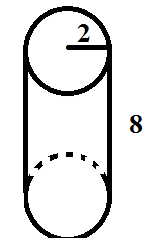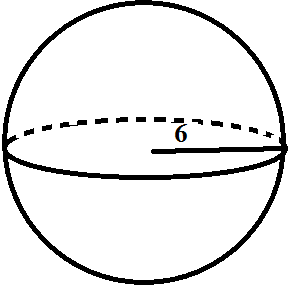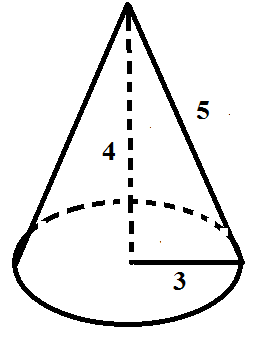Try It
Surface Area Practice
Problem #1
- Find the total surface area of the following shape.
- How many faces does this shape have?
Answer: 12
- What is the total surface area?
Answer: 538
How to Solve:
(12)(8) = 96
(3)(7) = 21
(12)(8) = 96
(3)(7) = 21
(12)(7) = 84
(3)(4) = 12
(4)(7) = 28
(3)(4) = 12
(8)(7) = 56
(4)(7) = 28
(8)(7) = 56
(4)(7) = 28
- How many faces does this shape have?
Problem #2
- Find the total surface area of the following shape.
- How many faces does this shape have?
Answer: 10
- What is the total surface area?
Answer: 1,440
How to Solve:
Front and back: 2[(21)(21) – (9)(9)] = 720
Outside faces: 4[(6)(21)] = 504
Inside faces: 4[(6)(9)] = 216
720 + 504 + 216 = 1,440
- How many faces does this shape have?
Problem #3
- Find the total surface area of the following shape.
- How many faces does this shape have?
Answer: 8
- What is the total surface area?
Answer: 750
How to Solve:
Outside faces:
(15)(7) = 105
(11)(7) = 77
(13)(7) = 91
(9)(7) = 62
(4)(7) = 28
(4)(7) = 28
Front and back:
[(13)(11) + (9)(4)] = 358
105 + 77 + 91 + 62 + 28 + 28 + 358 = 750
- How many faces does this shape have?
Problem #4
- Find the total surface area of the following shape.
- How many faces does this shape have?
Answer: 5
- What is the total surface area?
Answer: 1,886
How to Solve:
A = ½ bh
A = ½ (22) 16
A = 176
A = ½ bh
A = ½ (22)(16)
A = 176
A = lw
A = (26)(18) = 468
A = lw
A = (26)(22) = 572
A = lw
A = (26)(19) = 494
176 + 176 + 468 + 572 + 494 = 1,886
- How many faces does this shape have?
Problem #5
- Find the total surface area of the following shape.

- What formula should you use?
Answer:SA = 2πr2 + πdh
- What is the total surface area?
Answer:40π
How to Solve:
SA = 2πr2 + πdh
SA = 2π(22) + π(4)(8)
SA = 2π(4) + π(4)(8)
SA = 8π + 32π
SA = 40π
- What formula should you use?
Problem #6
- Find the total surface area of the following shape.

- What formula should you use?
Answer: SA = 4πr2
- What is the total surface area?
Answer: 144π
How to Solve:
SA = 4πr2
SA = 4π(62)
SA = 4π(36)
SA = 144π
- What formula should you use?
Problem #7
- Find the total surface area of the following shape.

- What formula should you use?
Answer: SA = πr2 + πrl
- What is the total surface area?
Answer: 24π
How to Solve:
SA = πr2 + πrl
SA = π(32) + π(3)(5)
SA = π(9) + π(15)
SA = 24π
- What formula should you use?
Volume Practice
Problem #8
- Find the volume of the following shape.
- How many rectangular prisms is this divided into?
Answer: 2
- What is the volume?
Answer: 756
How to Solve:
V = lwh
V = (7)(8)(12)
V = 672
V = lwh
V = (3)(4)(7)
V = 84
672 + 84 = 756
- How many rectangular prisms is this divided into?
Problem #9
- Find the volume of the following shape.
- How many rectangular prisms should you divide this into?
Hint
Answer: 4
- What is the total volume?
Answer: 2,160
How to Solve:
2[(6)(21)(6)] = 1,512
2[(6)(9)(6)] = 648
1,512 + 648 = 2,160 - There is another way to solve this problem.
Answer: You can also find the volume of the entire shape and then subtract the piece cut out of the center.
V = lwh
V = (21)(21)(6)
V = 2,646
V = lwh
V = (9)(9)(6)
V = 486
2,646 − 486 = 2,160
- How many rectangular prisms should you divide this into?
Problem #10
- Find the volume of the following shape.
- How many rectangular prisms should you divide this into?
Hint
Answer: 2
- What is the volume?
Answer: 1,253
How to Solve:
V = lwh
V = (15)(9)(7)
V = 945
V = lwh
V = (4)(11)(7)
V = 308
945 + 308 = 1,253 - There is another way to solve this problem.
Answer: You can also find the total volume and subtract the piece that is missing from the corner.
V = lwh
V = (15)(13)(7)
V = 1,365
V = lwh
V = (4)(4)(7)
V = 112
1,365 − 112 = 1,253
- How many rectangular prisms should you divide this into?
Problem #11
- Find the volume of the following shape.

- What formula should you use?
Answer: V = πr2h
- What is the volume?
Answer: 32π
How to Solve:
V = πr2h
V = π(22)(8)
V = π(4)(8)
V = 32π
- What formula should you use?
Problem #12
- Find the volume of the following shape.

- What formula should you use?
Answer: V = 4/3 πr3
- What is the volume?
Answer: 288π
How to Solve:
V = 4/3 πr3
V = 4/3 π(63
V = 4/3 π(216)
V = 288π
- What formula should you use?
Problem #13
- Find the volume of the following shape.

- What formula should you use?
Answer: V = 1/3 πr2h
- What is the volume?
Answer: 12π
How to Solve:
V = 1/3 πr2h
V = 1/3 π(32)(4)
V = 1/3 π(9)(4)
V = 1/3 π(36)
V = 12π
- What formula should you use?